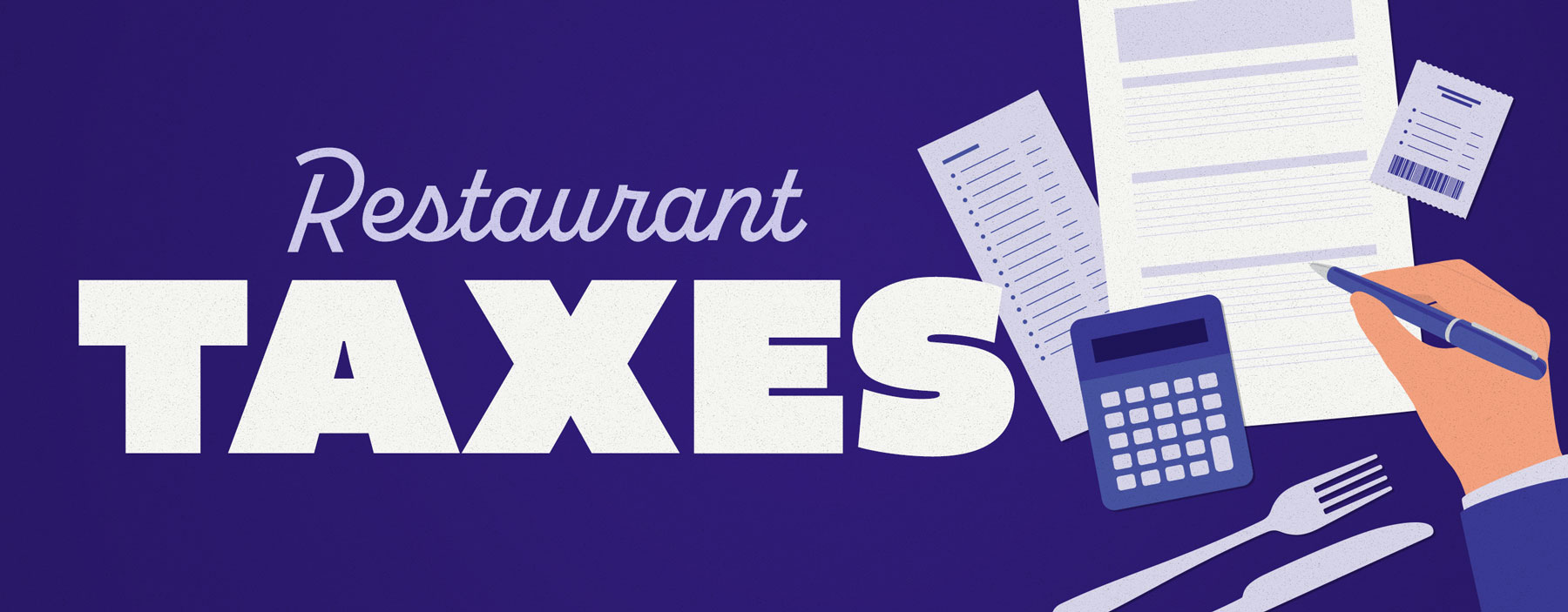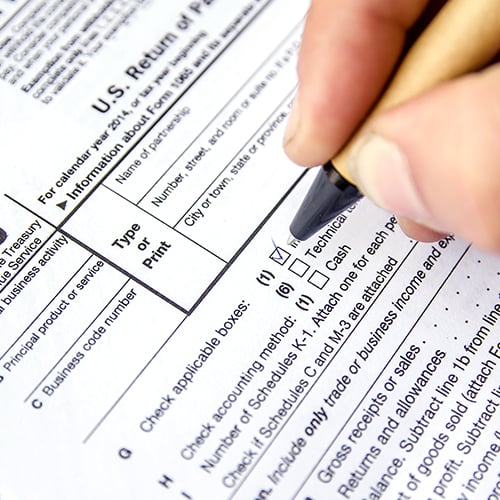
Taxes are an integral part of restaurant accounting and running any type of commercial establishment. Understanding and complying with tax regulations is required from restaurants in order to maintain a successful operation and avoid legal trouble. Unfortunately, restaurant taxes can be a complicated topic that involves many different rules and laws, making it hard for restaurant operators to fully grasp what's required from them. For guidance, we’ve created a comprehensive overview of restaurant taxes that outlines what taxes restaurants are responsible for and how restaurants can reduce their tax burden by maximizing deductions.
What Taxes Do Restaurants Pay?

Restaurants, like any other business, are required to pay various taxes to the government. Understanding the different types of taxes that restaurants are required to pay is important for restaurant owners and managers to ensure compliance with tax laws and to plan their finances effectively.
1. Restaurant Sales Tax
Restaurants are generally required to collect sales tax from their customers on the purchase of food and beverages. The sales tax rate can vary depending on the state and local jurisdiction where the restaurant is located. It's important for restaurant owners to understand the specific sales tax requirements in their area and to accurately collect and pay the tax to the appropriate tax authority.
2. Restaurant Payroll Tax
Restaurants with employees are required to withhold and send payroll taxes. These taxes include federal and state income tax withholdings, Social Security tax, and Medicare tax. Employers are also responsible for paying a portion of the Social Security and Medicare taxes on behalf of their employees.
3. Restaurant Income Tax
Restaurants, as business entities, are subject to federal and state income taxes. Income tax is calculated based on the net income of the restaurant, which is the total revenue minus deductible expenses. The tax rate varies depending on the income level and the tax laws of the jurisdiction. Restaurant owners are required to keep detailed records of their income and expenses, allowing them to accurately calculate and pay their income tax.
4. Restaurant Property Tax
Restaurants that own their physical property are subject to property taxes. Property tax is based on the assessed value of the property and is used to fund local government services. The specific property tax rate and assessment methods can vary depending on the jurisdiction. Restaurant owners should be aware of their property tax obligations when analyzing potential locations and ensure that they pay the tax on time to avoid penalties and interest.
Depending on the location and specific circumstances of the restaurant, there may be additional taxes that need to be paid. For example, some jurisdictions impose taxes on alcohol sales, hotel occupancy, or entertainment events. It's important for restaurant owners to be aware of any additional taxes that may apply to their business and to comply with the relevant tax laws.
Restaurant Tax Deductions

By taking advantage of restaurant tax deductions, you can reduce your tax liability and save more money for your business. Below, we take a closer look at some common deductions that restaurant owners can claim.
- Overhead Costs - As a restaurant owner, you likely have a variety of overhead costs, including rent, utilities, and insurance. These expenses can be deducted from your taxes, helping to lower your overall tax bill.
- Inventory - The IRS allows you to deduct the cost of goods sold from your taxes. This includes the cost of ingredients, beverages, and any other items used in the preparation of your menu items.
- Labor Costs - Labor costs, including wages, salaries, and payroll taxes, can also be deducted from your taxes. This deduction applies to both full-time and part-time employees, as well as contractors and freelancers.
- Vehicle Expenses - If you use a vehicle for business purposes, such as making deliveries or attending meetings, you may be eligible for deductions related to vehicle expenses. Expenses that fall under this category include fuel costs, maintenance and repairs, insurance, and even depreciation.
- Marketing Expenses - In today's digital age, marketing is an essential aspect of running a successful restaurant. The good news is that many marketing expenses can be deducted from your taxes. Costs associated with advertising, social media promotion, printing menus and flyers, and website development can be listed as marketing deductions.
- Professional Fees - As a restaurant owner, you may hire professionals such as accountants, lawyers, or consultants to assist with various aspects of your business. These professional fees can be deducted from your taxes, helping to offset the cost of their services.
It's important to note that tax laws can be complex and subject to change. To ensure that you are maximizing your deductions and staying compliant with the IRS, it's advisable to consult with a qualified tax professional who specializes in the restaurant industry.
Restaurant Ownership Structure Taxes

When it comes to restaurant ownership, choosing the right structure is crucial for tax purposes. Different restaurant ownership structures have different tax implications, and understanding these implications can help restaurant owners make informed decisions. We’ve outlined some of the most common ownership structures and their corresponding tax considerations:
1. Sole Proprietorships
A sole proprietorship is the simplest form of restaurant ownership. In this structure, the restaurant is owned and operated by a single individual. From a tax perspective, the owner reports the business's income and expenses on their personal tax return. This means that the owner is responsible for paying income tax, self-employment tax, and any other applicable taxes related to the business.
2. Partnerships
Partnerships involve two or more individuals who share the ownership and management responsibilities of a restaurant. In terms of taxes, partnerships file an informational tax return, known as Form 1065. This form is used to report the partnership's income, deductions, gains, and losses. However, the partnership itself does not pay income tax. Instead, the income and losses are passed through to the individual partners, who report them on their personal tax returns.
3. Cooperatives
Cooperatives are owned and operated by a group of individuals or businesses who work together to achieve common goals. In a cooperative restaurant, the members share both the profits and the decision-making process. When it comes to taxes, cooperatives are treated similarly to partnerships. The cooperative files an informational tax return, and the members report their share of the income and expenses on their personal tax returns.
4. Limited Liability Corporations (LLCs)
LLCs are a popular ownership structure for restaurants due to their flexibility and liability protection. By default, a single-member LLC is treated as a sole proprietorship for tax purposes, and the owner reports the income and expenses on their personal tax return. However, an LLC can also choose to be taxed as a partnership, S corporation, or C corporation, depending on its specific needs and goals.
5. C Corporations
C corporations are separate legal entities from their owners, offering limited liability protection. When taxed, C corporations are subject to double taxation. The corporation pays taxes on its profits, and the owners pay taxes on any dividends they receive. C corporations file a separate tax return using Form 1120, and the corporate tax rates are different from individual tax rates.
6. S Corporations
S corporations are similar to C corporations in terms of limited liability protection, but they offer a different tax structure. S corporations do not pay income tax at the corporate level. Instead, the income and losses are passed through to the shareholders, who report them on their personal tax returns. To qualify as an S corporation, the restaurant must meet certain eligibility requirements, such as having no more than 100 shareholders and only one class of stock.
Tax Tips for Restaurant Owners

As a restaurant owner, there are several tips and tricks you can utilize to make dealing with taxes an easier task. Below we’ve outlined some of the most important tips to be aware of when filing for restaurant taxes:
- Keep Accurate and Organized Records - Keep track of all your income and expenses, including sales receipts, invoices, payroll records, and bank statements. This will not only help you file your tax returns accurately but also make it easier to respond to any inquiries from tax authorities.
- Separate Personal and Business Expenses - Use separate bank accounts and credit cards for your restaurant and personal expenses. This will help you determine which expenses are deductible for your business and ensure that you don't mix personal expenses with business expenses.
- Stay Up-to-Date with Tax Law Changes - Tax laws are subject to change, and it's crucial to stay informed about any updates or new regulations that may affect your restaurant. Subscribe to newsletters or publications from tax authorities, attend industry seminars, or consult with a tax professional to ensure you are aware of any changes that may impact your tax obligations.
- Seek Professional Advice - Consider working with a qualified tax professional who specializes in restaurant taxation. They can provide valuable advice, help you navigate the intricacies of tax laws, and ensure you are maximizing your tax savings while remaining compliant.
Staying organized, understanding tax laws, and seeking professional guidance is key to managing restaurant taxes effectively. By doing so, restaurant owners can minimize their tax liabilities, maximize their deductions, and ensure compliance with the law, ultimately contributing to the financial success and sustainability of their business.





